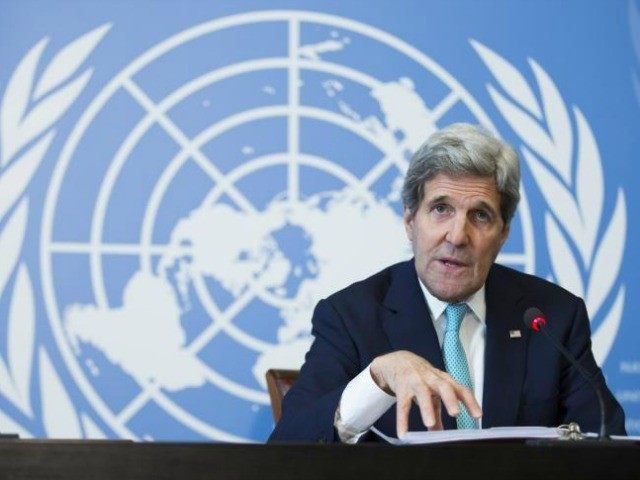In an effort to ease Gulf state officials’ concerns about an Iran nuclear deal, U.S. Secretary of State John Kerry affirmed that America would not “take our eye off Iran’s destabilizing actions” in the Middle East.
On Thursday, Kerry met with officials from the Gulf nations in Saudi Arabia after meeting with Iranian Foreign Minister Mohammed Javad Zarif over a three-day period in Switzerland.
“Even as we engage in these discussions with Iran around this program, we will not take our eye off Iran’s destabilizing actions in places like Syria, Lebanon, Iraq and the Arabian Peninsula, Yemen particularly,” the secretary of state told reporters in Riyadh.
Secretary Kerry wanted to reach a framework agreement with Iran by the March 31 deadline.
“The United States’ Gulf allies, particularly the Sunni Muslim kingdom of Saudi Arabia, worry that a nuclear accord will not stop Iran from gaining the bomb,” reports Voice of America (VOA). “They are also concerned it would ease international pressure on Tehran and give it more room to intervene in regional issues.”
Kerry also told reporters on Thursday that a nuclear deal would not be part of a “grand bargain” with Iran, adding that the U.S. would continue to support its partners in the Gulf against Iranian malign influence.
“Nothing will be different the day after this agreement, if we reach one, with respect to any other issues that challenge us in this region, except we will have taken steps to guarantee that Iran will not have a nuclear weapon,” Kerry explained.
Gen. Lloyd Austin, the commander of U.S. Central Command, told a congressional panel that Iran poses the “most significant threat” in the Middle East.
On Thursday, Kerry held meetings with the foreign ministers of the Gulf Cooperation Council, which includes Bahrain, Kuwait, Oman, Qatar, Saudi Arabia, and the United Arab Emirates.
All of those nations “are Sunni-led states unnerved by Shi’ite Iran’s suspected pursuit of nuclear weapons and its increasing assertiveness throughout the region,” notes VOA.
The U.S., as part of the P5+1 group, is trying to reach a deal that would prevent Iran, Saudi Arabia’s regional rival, from acquiring a nuclear bomb.
A deal would ease West-imposed sanctions on Iran, which argues that its nuclear program is peaceful.
President Obama has suggested that Iran verifiably freezes its nuclear program for at least ten years, a deal that even members of his own party find unacceptable.
“We have made progress, but there do remain serious gaps that need to be resolved,” Kerry said of efforts to broker a framework agreement.
“It may be that Iran cannot say yes to the type of deal that provides the assurances that the international community requires,” he also said, later adding, “We expect soon thereafter to know whether Iran will in fact be able to make the tough decision.”
Kerry and Gulf officials were also expected to discuss the Islamic State (ISIS/ISIL) threat to the region and Shi’ite Houthi rebels’ takeover of the Yemeni capital.
The Associated Press and Reuters contributed to this report.

COMMENTS
Please let us know if you're having issues with commenting.